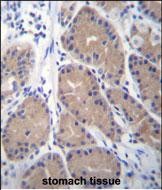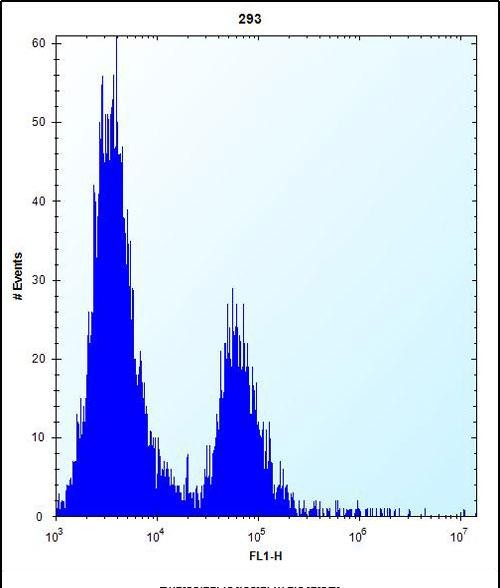CA1 Antibody (N-term)
Purified Rabbit Polyclonal Antibody (Pab)
- 产品详情
- 实验流程
- 背景知识
Application
| WB, IHC-P, FC, E |
|---|---|
| Primary Accession | P00915 |
| Other Accession | NP_001122301.1, NP_001122302.1 |
| Reactivity | Human |
| Host | Rabbit |
| Clonality | Polyclonal |
| Isotype | Rabbit IgG |
| Calculated MW | 28870 Da |
| Antigen Region | 60-90 aa |
| Gene ID | 759 |
|---|---|
| Other Names | Carbonic anhydrase 1, Carbonate dehydratase I, Carbonic anhydrase B, CAB, Carbonic anhydrase I, CA-I, CA1 |
| Target/Specificity | This CA1 antibody is generated from rabbits immunized with a KLH conjugated synthetic peptide between 60-90 amino acids from the N-terminal region of human CA1. |
| Dilution | WB~~1:1000 IHC-P~~1:100~500 FC~~1:10~50 E~~Use at an assay dependent concentration. |
| Format | Purified polyclonal antibody supplied in PBS with 0.09% (W/V) sodium azide. This antibody is prepared by Saturated Ammonium Sulfate (SAS) precipitation followed by dialysis against PBS. |
| Storage | Maintain refrigerated at 2-8°C for up to 2 weeks. For long term storage store at -20°C in small aliquots to prevent freeze-thaw cycles. |
| Precautions | CA1 Antibody (N-term) is for research use only and not for use in diagnostic or therapeutic procedures. |
| Name | CA1 |
|---|---|
| Function | Catalyzes the reversible hydration of carbon dioxide (PubMed:10550681, PubMed:16506782, PubMed:16686544, PubMed:16807956, PubMed:17127057, PubMed:17314045, PubMed:17407288, PubMed:18618712, PubMed:19186056, PubMed:19206230). Can hydrate cyanamide to urea (PubMed:10550681). |
| Cellular Location | Cytoplasm {ECO:0000250|UniProtKB:B0BNN3}. |
For Research Use Only. Not For Use In Diagnostic Procedures.
Provided below are standard protocols that you may find useful for product applications.
BACKGROUND
Carbonic anhydrases (CAs) are a large family of zinc metalloenzymes that catalyze the reversible hydration of carbon dioxide. They participate in a variety of biological processes, including respiration, calcification, acid-base balance, bone resorption, and the formation of aqueous humor, cerebrospinal fluid, saliva, and gastric acid. They show extensive diversity in tissue distribution and in their subcellular localization. CA1 is closely linked to CA2 and CA3 genes on chromosome 8, and it encodes a cytosolic protein which is found at the highest level in erythrocytes. Variants of this gene have been described in some populations. Multiple alternatively spliced variants, encoding the same protein, have been identified. Transcript variants of CA1 utilizing alternative polyA_sites have been described in literature.
REFERENCES
Abhary, S., et al. Mol. Vis. 15, 1179-1184 (2009) :
Gambhir, K.K., et al. Biochem. Genet. 45 (5-6), 431-439 (2007) :
Temperini, C., et al. Bioorg. Med. Chem. Lett. 17(8):2210-2215(2007)
Temperini, C., et al. Bioorg. Med. Chem. Lett. 16(19):5152-5156(2006)
Dawson, S.J., et al. J. Infect. 24(3):317-320(1992)
终于等到您。ABCEPTA(百远生物)抗体产品。
点击下方“我要评价 ”按钮提交您的反馈信息,您的反馈和评价是我们最宝贵的财富之一,
我们将在1-3个工作日内处理您的反馈信息。
如有疑问,联系:0512-88856768 tech-china@abcepta.com.























 癌症的基本特征包括细胞增殖、血管生成、迁移、凋亡逃避机制和细胞永生等。找到癌症发生过程中这些通路的关键标记物和对应的抗体用于检测至关重要。
癌症的基本特征包括细胞增殖、血管生成、迁移、凋亡逃避机制和细胞永生等。找到癌症发生过程中这些通路的关键标记物和对应的抗体用于检测至关重要。 为您推荐一个泛素化位点预测神器——泛素化分析工具,可以为您的蛋白的泛素化位点作出预测和评分。
为您推荐一个泛素化位点预测神器——泛素化分析工具,可以为您的蛋白的泛素化位点作出预测和评分。 细胞自噬受体图形绘图工具为你的蛋白的细胞受体结合位点作出预测和评分,识别结合到自噬通路中的蛋白是非常重要的,便于让我们理解自噬在正常生理、病理过程中的作用,如发育、细胞分化、神经退化性疾病、压力条件下、感染和癌症。
细胞自噬受体图形绘图工具为你的蛋白的细胞受体结合位点作出预测和评分,识别结合到自噬通路中的蛋白是非常重要的,便于让我们理解自噬在正常生理、病理过程中的作用,如发育、细胞分化、神经退化性疾病、压力条件下、感染和癌症。








